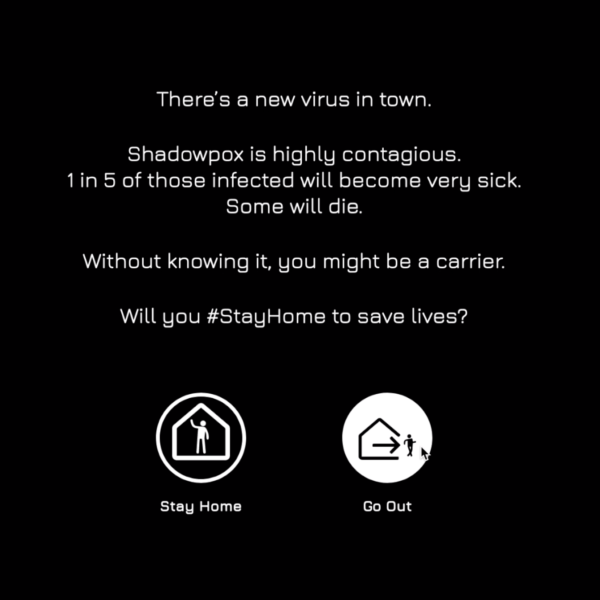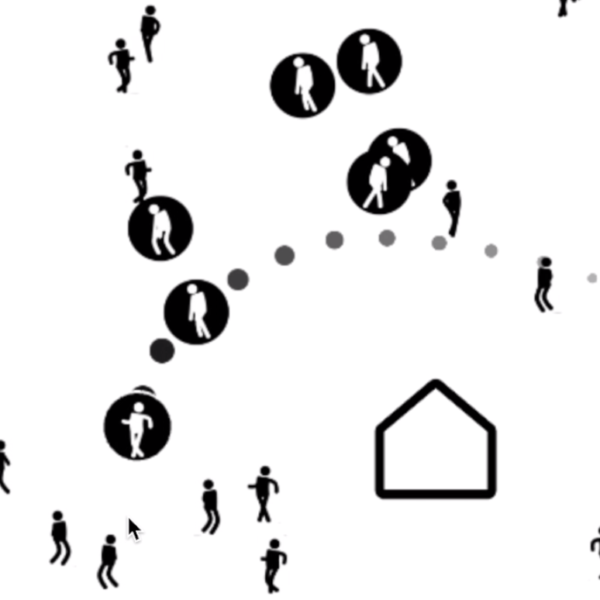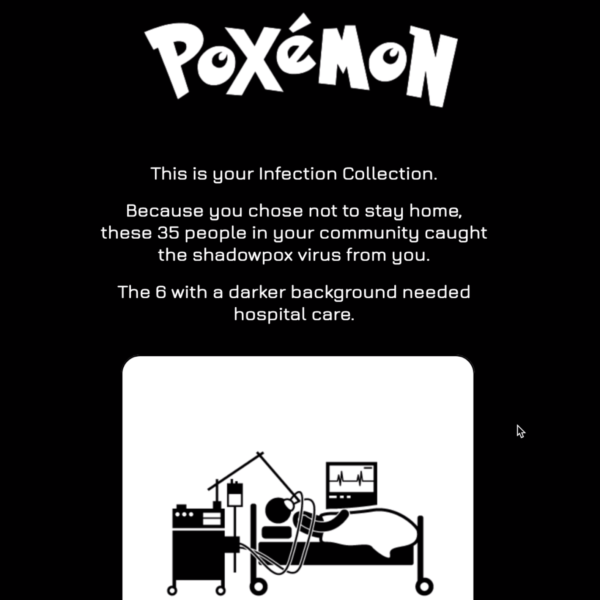#StayHome To Win
TORONTO, Wednesday, April 8, 2020 – A new online game set in an immersive science fiction storyworld but informed by real-world public health challenges was launched today by York University researchers. Shadowpox: #StayHome Edition helps players visualize – in a fun and engaging way – the impact of deciding to stay home during the COVID-19 pandemic, and the effect on their community if they do not.
“Imagining a deadly new virus composed of shadows, Shadowpox uses ‘co-immunity’ as a metaphor for the power we each have to make choices that will have a destructive or constructive effect on the people and the world around us,” says Alison Humphrey, who created the transmedia storyworld as part of her doctoral research in the School of the Arts, Media, Performance & Design at York University. “The Shadowpox game design is simple and playful, but it hinges on a potentially life-or-death decision each of us is now making every day.”
The new online game is based on the full-body videogame Shadowpox: The Antibody Politic, which was designed to make visible the invisible consequences of an individual’s immunization choices. That work debuted as part of the exhibition <Immune Nations>, opening at the 2017 Conference on Global Health and Vaccination Research in Trondheim, Norway, and then touring to Geneva, Switzerland during the 70th Assembly of the World Health Organization.

As Humphrey watched the WHO declare COVID-19 a pandemic last month, she started thinking about how to adapt the existing game as a contribution to the global campaign to “flatten the curve” through social distancing. The original Shadowpox team ramped up for a #StayHome reboot in just two weeks.
“The game starts with a choice: ‘Stay Home’ or ‘Go Out’. Your character is asymptomatic and unaware they’re infected, so if you choose to ‘Go Out,’ you’re shedding viral shadowpox circles everywhere you go,” says Humphrey. “Meanwhile, 99 other people in your neighbourhood are going about their business – maybe they’re key workers, or getting their once-a-week groceries. Each one that meets you or crosses your trail has a 50 percent chance of becoming infected. Of those, one in five will need hospital care, and one percent may die. At the end of the game, you get an overall ‘infection score,’ but more importantly, you get a rare glimpse into the lives your choice affected.”
https://twitter.com/YorkUnews/status/1247966267174268928?s=20
Humphrey’s York collaborators include Professor Caitlin Fisher of the School of the Arts, Media, Performance & Design; Steven Hoffman, Professor, Faculty of Health and Osgoode Hall Law School, and Director of the Global Strategy Lab; Susan Rogers Van Katwyk, Investigator, Global Strategy Lab; and Shadowpox technical director LaLaine Ulit-Destajo, a recent Computational Arts alumna.

“We’ve been working with Alison to ensure this game is based on real data and real modelling,” says Hoffman, scientific director on the game, who provided data to help inform the game’s outcomes. “I’m really excited about Shadowpox because it highlights the way that art and data can come together in order to inform and engage people in how to respond to infectious disease threats. Originally, the game was developed in the context of vaccination, and while we don’t yet have a vaccine for COVID-19, in the meantime we do have a choice: not whether to vaccinate or not, but whether to stay home or not. So what this game does, is it gives us a way to empower people to be part of community immunity.”
Each time the game is played, depending on the choice to go out or stay home, the player’s final score converts into an “Infection Collection” or “Protection Collection” of up to 99 “Poxémon” virtual trading cards written by Fisher, bringing to life the 99 neighbours who can be touched by a single decision.

“The idea of the Poxémon cards is to turn cold statistics into something personal,” says Humphrey. “Each one of the people in that number is an individual. They’ve got dreams, fears, a favourite food, a new job, friends, family – they are important to many people. Statistics are abstract, but the pictures and stories on the cards can bring those lives to light.”
The game is being submitted to the United Nations Global Call Out to Creatives to Help Stop the Spread of COVID-19. Winning selections will be announced on April 22, 2020.
Humphrey will use the larger Shadowpox storyworld to teach a new undergraduate course in York's Department of Cinema and Media Arts in the fall of 2020.
“Games are interactive – unlike a movie where the plot is fixed, games need us to make choices to change the outcome. So our hope is that this little game can spark the player’s imagination and remind them that their choice to #StayHome is making them a hero in the real world.”
Shadowpox: #StayHome Edition is at shadowpox.org/game.
For more information, please see shadowpox.org and alisonhumphrey.com
York University champions new ways of thinking that drive teaching and research excellence. Our students receive the education they need to create big ideas that make an impact on the world. Meaningful and sometimes unexpected careers result from cross-disciplinary programming, innovative course design and diverse experiential learning opportunities. York students and graduates push limits, achieve goals and find solutions to the world’s most pressing social challenges, empowered by a strong community that opens minds. York U is an internationally recognized research university – our 11 faculties and 25 research centres have partnerships with 200+ leading universities worldwide. Located in Toronto, York is the third largest university in Canada, with a strong community of 53,000 students, 7,000 faculty and administrative staff, and more than 300,000 alumni.
Media contact:
Anjum Nayyar, York University Media Relations, cell 437-242-1547, anayyar@yorku.ca

